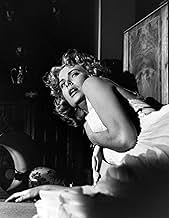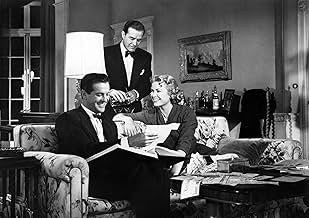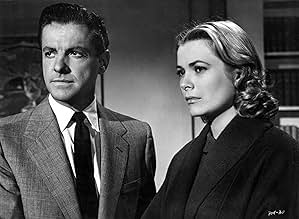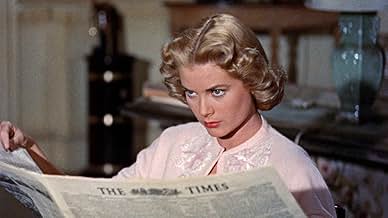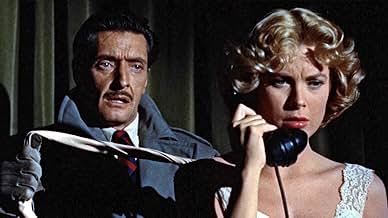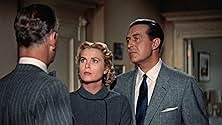A London playboy plots the perfect murder of his rich, unfaithful Wife.A London playboy plots the perfect murder of his rich, unfaithful Wife.A London playboy plots the perfect murder of his rich, unfaithful Wife.
- Nominated for 1 BAFTA Award
- 5 wins & 3 nominations total
- Banquet Member
- (uncredited)
- Detective
- (uncredited)
- Bobby Outside Flat
- (uncredited)
- Police Photographer
- (uncredited)
- Detective
- (uncredited)
- Woman Departing Ship
- (uncredited)
- Banquet Member
- (uncredited)
- Banquet Member
- (uncredited)
Summary
Featured reviews
Dial M for Murder succeeds on many levels, and it is largely thanks to some superb dialogue, written from a tricksy-yet-capable script that never gets too deep. The cast are a treat. Ray Milland is an absolute gem, extremely sly and dispassionate, yet a character so full of self-assurance that one almost sides with him. Grace Kelly completes her great year (she gave an Oscar-winning performance in The Country Girl and also starred in Rear Window) by emanating the poised, beautiful being, that is vulnerable, yet oddly unassailable. And it's weird in that even though she's cheating on her husband, you care for her a lot more than him (although that could do with the fact that he's trying to kill her...) And John Williams, as the police detective, is quite wonderful.
Alfred Hitchcock manipulates and enthrals his audience here like the master that he is. Each scene has a sense of direction, great pacing, and is staged realistically. Stunning full colour photography and a haunting, atmospheric score from Dimitri Tiomkin complete this great package. The ending, when it comes, feels a little too nice to be truly realistic, but that is my only major quibble with an otherwise highly entertaining, thrilling movie.
Ray Milland (Tony Wendice) is a surprisingly sympathetic villain (which is perhaps not surprising from the actor with talent, charm, and charisma that equal and remind a lot of both Cary Grant and Jimmy Stewart) who knows about his wife cheating and decides to teach her a lesson by plotting a very clever murder which will make him a sole heir to her money (she is a wealthy one in the family). His plan is perfect and almost works but Margot managed to not only escape the murderer but to turn the table on him while stunned Wendice is on the phone and listens how his well thought of plan collapses. Wendice is very resourceful and he proved to be a master of improvisation because it took him a few minutes in a cab to switch to a plan B that turned a terrified victim Margot into a cold-blooded murderess. Now it is up to seasoned and shrewd inspector Hubbard (John Williams) to find the crucial piece of evidence and to solve the case.
As always with Hitchcock, his directing is impeccable, the camera rarely leaves Wendice's apartment but the film is never claustrophobic which is the case for many plays' adaptation. It breathes and moves freely and we almost forget that we are in the same room for close to two hours. I would not call "Dial M for Murder" my favorite Hitchcock's film but it is enjoyable, clever, and witty thriller with the interesting twists, outstanding performances, and more than one truly memorable scenes.
Time has not diminished this gem and it deserves its fame and status.
Cold Ray Milland plans and sets up the murder of his demure but faithless wife Grace Kelly by a virtual stranger who is urged on by the stick of exposure of his misdeeds and the carrot of GBP1,000 in used notes. Of course all of his convoluted plans go horribly or thankfully wrong, depending on your point of view, leading to an even more convoluted revised plan. When first seen when young I wasted my time because I wasn't paying attention at the critical moment so missed the point and didn't get it: the key is how did the baddie get into the apartment? It's incredibly verbose, being from a stage play after all and at times it seems nothing more than a radio show with pictures. The long scene setting and verbal sparring by Milland and Anthony Dawson is superb to hear - it's fascinating for its relentless poetry, and of displaying a now-dead world. I could never understand the attraction of 3D movies, least of all with this particular attempt, or why Kelly was continually uglified by the Hollywood machine when she never looked lovelier than in here when she was playing stressed out throughout.
I wonder if Hitch remembered the jokey murder scene he did in 1930 in Elstree Calling when Jameson Thomas realised he was murdering in the wrong apartment? Turn that key you have and go in, it's a remarkably literate film and as intricate inside as any lock.
I'm working my way through Hitchcock's tremendous catalogue of films, I've kept this one til the end purposely, as I regard it as one of his best. It's suspenseful, it's intriguing, but best if all, it's clever.
Dial M for Murder has a genius plot, it is so clever, the plot is intricate and complicated, it never fails to impress me, so many details, and a spider's web that few could imagine.
I've been lucky enough to see this on stage a few times, it lends itself very well to The Theatre, this is one film I'd love to see retold.
I'm glad Ray Milland was cast as Tony, he's perfect in the role, he's charming and respectable, but has a wolfish like quality, the kind of guy that would shake your hand, then give you a black eye later on. Grace Kelly and Robert Cummings are terrific.
It's been adapted a few times, one version I quite enjoyed is a Perfect Murder, featuring Michael Douglas, it's not a patch on this, but it's very good.
I love that there's an intermission in it, it's a shame the third Lord of The Rings film didn't follow suit.
9/10.
Did you know
- TriviaJohn Williams won the 1953 Tony Award for Best Featured Actor in a Play for "Dial M for Murder" as Inspector Hubbard. He re-created the role in this movie.
- GoofsWendice throws a £100 bundle on a pink armchair. The money falls right at the back of the seat. A few minutes later, Swann takes the money which is now right in front of the armchair.
- Quotes
Tony Wendice: How do you go about writing a detective story?
Mark Halliday: Well, you forget detection and concentrate on crime. Crime's the thing. And then you imagine you're going to steal something or murder somebody.
Tony Wendice: Oh, is that how you do it? It's interesting.
Mark Halliday: Yes, I usually put myself in the criminal's shoes and then I keep asking myself, uh, what do I do next?
Margot Mary Wendice: Do you really believe in the perfect murder?
Mark Halliday: Mmm, yes, absolutely. On paper, that is. And I think I could, uh, plan one better than most people; but I doubt if I could carry it out.
Tony Wendice: Oh? Why not?
Mark Halliday: Well, because in stories things usually turn out the way the author wants them to; and in real life they don't... always.
Tony Wendice: Hmm.
Mark Halliday: No, I'm afraid my murders would be something like my bridge: I'd make some stupid mistake and never realize it until I found everybody was looking at me.
- Crazy creditsThe title is shown on a background of a British telephone dial; its MNO marking is replaced by a single large M which forms the single M of the title.
- Alternate versionsThe film had an intermission in its original 3-D release, although it is less than two hours in length.
- ConnectionsEdited into Histoire(s) du cinéma: Le contrôle de l'univers (1999)
Details
Box office
- Budget
- $1,400,000 (estimated)
- Gross US & Canada
- $24,845
- Opening weekend US & Canada
- $12,562
- Apr 11, 1999
- Gross worldwide
- $45,313
- Runtime
- 1h 45m(105 min)
- Color
- Aspect ratio
- 1.66 : 1



